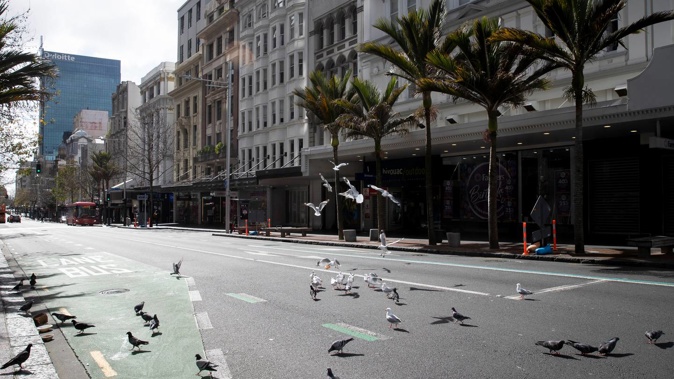
By RNZ
Director of the Malaghan Institute of Medical Research and the programme director of the Vaccine Alliance, Professor Graham Le Gros, says social and economic pressures and how much people can withstand restrictions should also determine when to abandon the elimination strategy.
"This is only one event that got across the border and look at the mayhem, one month lockdown, a billion dollars a week - that's just not sustainable in the long term and all the pressure that people are under ... the family issues, the schools, the devastation to the economy and the extra health issues.
"People aren't getting their colonoscopies, getting their skin checked for melanoma, heart check ups, all those things are really important health issues."
Le Gros says getting the population's vaccination rate up to 85-90 per cent would be an important step towards opening the country up.
"It would be fantastic because getting all of the vulnerable people safe was the first goal and then we go all the way through to the younger ones.
"I think then we can be reassured we can actually somehow cope with this virus in our community because you've got to realise this Delta virus is good, we're not quite catching up with it."
If the tail of the outbreak cannot be contained, Le Gros says the health system should now be in a position to cope with the consequences.
"Although we talk about the hospital systems being overwhelmed, I'm sure they must be working on the ability of the nursing system to cope and set up infectious critical care units and that sort of thing, they've had a year so hopefully they'll be in place too."
Auckland cannot afford to stay in alert level 4 until the population is 85-90 per cent vaccinated, he says.
/cloudfront-ap-southeast-2.images.arcpublishing.com/nzme/R2GDBRAU3OQL25VSSXWBX6N6X4.jpg)
"I think that's where the economic, the other health issues and the social pressures really start to come into play and I think that if you've got 70-80 per cent vaccinated even with the one jab you're in a pretty good situation to be able to withstand the major effects of this virus.
"I'm not throwing elimination out just yet ... but you've also just got to face facts if the virus has got away and it's just staying underground until it pops up again, then let's just focus on vaccination and learning to live with the virus."
Meanwhile, Auckland Mayor Phil Goff thinks moving down alert levels this week is looking increasingly unlikely after mystery cases of the virus were found at Middlemore Hospital.
But if the alert level coming down isn't on the cards, a fresh battering of local business confidence is.
Phil Goff says City Hall will be looking to central Government for support as the country's biggest city weathers its longest-ever lockdown.
"I think we need to stay the course, we've made a sacrifice now of four weeks and we're not going to lift the alert level if there is still the risk that the Covid infection can spread across the community, but every day that goes on beyond the first four weeks the strains of alert level 4 on people and on businesses are undoubtedly building up.
"Businesses have kind of held in there with the pace of economic recovery from the last lockdown being better than we expected, unemployment was down, we got good economic growth, but you can't stop businesses operating and people working without a real economic cost, so we are putting together a range of things that the Government might need to look at."
/cloudfront-ap-southeast-2.images.arcpublishing.com/nzme/FDDIIJGTQELDCWXO3BGRPPH6LE.jpg)
Goff says some Auckland business owners are calling for government support payments to be extended through to alert level 2.
"There are a range of things that are really helpful at the moment, the resurgence support payments and the wage subsidies, there's some discussion around the business community in Auckland that they could be extended through to level 2 when we get that far and the Covid-19 resurgence payment could be paid on a weekly rather than fortnightly basis.
"I understand that government is under pressure from everyone, they don't have endless funds, but I do think it's fair that any part of the country gets support proportionate to the high level of burden that they are carrying."
Goff says lockdown is hurting the most vulnerable people, with demand for food bank parcels 260-270 per cent higher than in the first lockdown.
"It's the most vulnerable communities that are feeling this the hardest, you know the families who were just scraping by on a normal wage but when that wage gets cut back because the business they work for can't operate, they move from being able to subsist to under subsistence level."
Goff says the big challenge for Auckland now is vaccination.
"Seventy-four per cent of the population has now either had their first vaccination or booked for vaccination, but it's what we do now to get to those hard-to-reach and perhaps vaccine-hesitant communities to get us up to the level we need."
Goff says health authorities have been vaccinating around 25,000 people per day over the last three days.
Ahead of today's Cabinet meeting to decide on any shift in lockdown levels, Deputy Prime Minister Grant Robertson says case numbers are just one factor in determining the status of the outbreak.
"It's interesting with Delta the total number of cases is really just one factor now because we know that with Delta that once it is in a household it does tend to infect quite a high percentage of the people in that household, you can have quite high case numbers that can potentially just relate to one or two households of people.
"What we are looking at are these so-called mystery cases, the cases that pop up that aren't immediately obviously connected to an existing case. What happens each day is work is done to analyse those cases, interviews are done with the people and for the vast bulk of them a link is found and so we have to keep going through that process.
"We've narrowed them [mystery cases] down to perhaps three sub-clusters where that's happening at the moment so we'll take a look at the advice we get from the Ministry of Health today as to the extent they feel that those mystery cases are under control and that will be a factor in our decision making."
Meanwhile, other parts of the country could potentially move further down the alert levels while Auckland remains in level 4, Robertson says.
"That's not impossible but it is something that we have to look very carefully at and I understand for people outside of Auckland particularly those in the South Island it's pretty frustrating even to find yourself in level 2 when you haven't had a case for a long time.
"This isn't about the South Island and whether we think there's a case there, this is about the fact that we have an outbreak in Auckland that we don't yet have fully contained and the risk that that could spread beyond that boundary.
"If it spreads into a level 1 environment that's much harder to manage than if it spreads into a level 2 environment where we've got more restrictions in place."
Robertson says the couple who breached lockdown rules to travel from Auckland to Wanaka put all New Zealanders at risk.
"[It's] potentially dangerous but more than anything else just hugely irresponsible and selfish from my point of view.
"We're working really hard to have a boundary in place that helps protect the whole of New Zealand, but if somebody is going to pretend to be on essential work and then go away on holiday that is putting everyone at risk."
Robertson acknowledges the couple were an exception to the "vast bulk" of Aucklanders who are sticking to the lockdown rules.
- RNZ
Take your Radio, Podcasts and Music with you









